
Behind Autistica and House 337’s Campaign Smashing Autism Stereotypes

In April, to mark World Autism Acceptance Month, UK charity Autistica and creative agency House 337 teamed up for a bold campaign that utilises humour, honesty, and lived experience to challenge stereotypes around autism. Directed by Sindha Agha and brought to life through collaboration with autistic creatives, the work flipped lazy assumptions on their head and invited audiences to “see autistic people as individuals – not stereotypes.”
“Of Autistica’s 2030 goals, we felt best placed to tackle the one about changing attitudes,” say the team at House 337. “It’s only from understanding that we can reach acceptance.” The idea was sparked by a powerful truth: many people think they understand autism, but too often they’re working off myths and misunderstandings. Instead of creating a preachy PSA, the team leaned into “cheeky, category-breaking” humour that pokes fun at neurotypical social norms.
At the heart of the campaign is Jess – played by Maria King – an unmasked autistic woman of colour, whose perspective shaped every creative decision. “Our main character’s subjectivity informed everything,” says the director. Today, LBB learns more about the making and meaning of the campaign.
With smart writing, stylised cinematography, and direct input from autistic contributors, this campaign doesn’t just raise awareness — it demands a reset in how we think, feel, and talk about autism.
LBB> What was the initial brief from Autistica, and how did it evolve into this final concept?
House337> Continuing our longstanding partnership with Autistica, they approached us with an idea of doing a campaign for World Autism Awareness Month in April. We launched the Invisible CV together last year, so we were aware of their 2030 goals:
All autistic people will have proven support from day one;
The employment rate for autistic people will double;
Autistic people will have proven treatments for anxiety;
Public spaces will be more accessible for neurodivergent people;
Every autistic adult will be offered a yearly, tailored health check;
Attitudes to autistic people will change.
Of their 2030 goals, we felt best placed to tackle number six: attitudes to autistic people will change. It’s only from understanding that we can reach acceptance, and ultimately, better outcomes for every autistic person. As an agency with a history of bringing important causes to the public’s attention and behaviour change campaigns, we felt it was the type of big challenge we wanted to take on.
Getting from Autistica’s goal to the final concept for the campaign was a wonderfully collaborative process. From a House337 POV, our starting point was looking at what the current attitudes towards autistic people are. Sadly, that meant seeing a lot of misconceptions, myths and lies. This felt like a natural starting point to get the ball rolling creatively. Autistica are the UK’s leading autism research charity, which means they sit on a wealth of rich data and insight which they are all too happy to share. This helped us to understand the most common and the most harmful stereotypes we needed to tackle.
From there, we developed a creative brief which explored the myths and realities of autism, working to the truism that: if you’ve met one autistic person, then you’ve met one autistic person.
LBB> How early did autistic creatives and lived experience groups become involved in the process?
House 337> It was baked into the process from the start, even informing our creative brief. We worked with Autistica’s lived experience panel to ensure we were shining a light on the myths which needed busting most. Bringing stories from the panel into our brief so our creative team heard it first hand.
During creative development, we were incredibly lucky to work with lived experience groups who were both deeply insightful and, let’s be honest, brilliantly challenging. That’s exactly what made them so valuable. The experience not only highlighted the richness of lived experience but also showcased the sheer creativity of the community. It’s not a stretch to say that several of the contributors could slot seamlessly into any creative agency.
In our first focus group, we took the group through the creative brief and our early creative development (OOH and AV scripts). We then had lengthy, honest and, at times, fiery discussions on the creative. Key themes and thoughts emerged around not being too divisive, ensuring inclusivity in design and language, and making sure we were not excluding or othering a mass audience.
Using the insights from our first lived experience group, we refined our creative, changed our language in places and developed some new executions. These were then taken to a second panel (consisting of some new and some returning faces) where we discussed our updates and welcomed new feedback. Responses were, once again, honest, constructive and insightful from our panel. We are so grateful for all members of the focus group and their contributions who helped shape the work into what it became.
LBB> The humour in the campaign is so effective — how did you balance being playful while staying respectful and accurate?
House 337> Lots of trial and error. The autistic research groups helped a lot here. We tried and tested various lines and chose our favourites based on what the groups gravitated towards and what our team found funny. Each scenario is grounded in both a stereotype of an autistic trait and a real, relatable truth, something that both neurotypical and autistic people experience and find frustrating, so we knew they were genuine insights.
LBB> What role did the character Jess play in shaping the tone and message of the campaign?
House337> Sindha was looking for an unmasked autistic person. Someone who was tired of adjusting their behaviour to put neurotypical people at ease. Someone who was comfortable expressing herself in a way that’s natural and sincere. Maria King who played Jess, was a late addition to the casting tapes and she came in and was just completely herself. It was exactly what we were looking for!
We perhaps may have gone for someone with more attitude, as initially scripted, all the ‘punchlines’ we’re delivered to camera, but we watched Maria’s casting tape and loved how honest and authentic she was in her portrayal of Jess. Her facial expressions perfectly demonstrated how we wanted Jess to feel about each scenario.
LBB> Sindha Agha’s direction adds so much depth — what was it like collaborating with her on this?
House 337> Sindha was incredible from the start. From our very first meeting she was excited, passionate and just buzzing to add her own voice to the project. She built on the honesty and bluntness in the script to push it even further. She made some tweaks (made it better), shaped the scenarios and added the Dan line – which we think sort of makes the film!! The whole process was completely collaborative and we’d love to work with her again.
LBB> What insights from Autistica’s research most influenced the creative approach?
House 337> We could not have gotten to work which spoke to the autistic experience without Autistica’s research. Every stereotype and myth we bust within the campaign came from Autistica’s research or lived experience members who so kindly shared with Autistica. So, it’s hard to pick out one singular piece insight in terms of stereotypes. However, there was one overarching insight which felt like the biggest unlock to us.
During the creative brief, it wasn’t enough just to say “it's said that autistic people lack empathy but that’s not true”. We had to show what the reality is– not just what it isn’t. A key unlock for us was when Autistica shared with us a way of thinking about the spectrum with more nuance than a simple linear spectrum ranging from mildly autistic to severely autistic (which is very common thinking). But instead thinking of the autistic experience as a set of dials which can be turned up, or turned down. Those dials may represent things such as a preference for routine, sensory issues, sense of loyalty, empathy, creative problem solving, a strong sense of justice (the list is quite literally endless). Those dials are different for everyone – not just autistic people. I think it really helped show that everyone with autism is different, and lazy stereotypes really have no place left in our discourse. This unlock really helped us get to “see us as individuals, not stereotypes”.
LBB> Can you talk us through any particular challenges you faced in developing the campaign?
House 337> One of the biggest challenges when developing a campaign for a charity from a production perspective is working within tight budgets and timelines. It requires finding production partners who are not only skilled but also willing to invest their time and resources into something they believe in. Fortunately, we were incredibly lucky to collaborate with The Corner Shop, and an amazing team - our production partners, cast, and crew - who truly believed in the campaign and brought it to life with genuine interest and professionalism.
LBB> How did you ensure neurodiverse representation wasn’t just present on screen, but embedded behind the scenes too?
Hous 337> This project gave us the opportunity to lead a truly neuroinclusive shoot, from casting to on-set protocols, and that’s something we are really proud of. For us it sets a precedent for how future productions can and should operate across the board.
As a director, Sindha was amazing, but as a human being, she was so considerate to all neurodiverse needs throughout the process.
LBB> What creative decisions were made to reflect the sensory experience of autism?
House 337> A lot! Everything from the choice of locations, to the sound design, to the decision to use slow motion, were a conscious choice to reflect the sensory experience of autism.
We selected locations that are often overwhelming for autistic people due to sensory stim or social scripts. Locations with harsh lighting, loud noise and where predictable conversations often occur. We also wanted to ensure we had a range of settings to show that so much of the world isn’t very accessible to autistic people.
To create the sense that we were viewing the world through Jess’ eyes, Sindha favoured a wide angle lens for crisp, close-up portraiture that accentuates facial features, subtle slow motion that reflected Jess’s unique experience of time, and hyperreal cinematography, that took cues from photographers like Martin Parr and Cindy Sherman.
Our initial idea on sound was to create an experience of sensory overwhelm highlighting how exhausting and distressing settings like a bar or restaurant can be for autistic people. However, we worked with Tony at Wave Studios and pulled a lot of the sound design back in the final film as we didn’t want to create a film that wasn’t accessible to the audience we were trying to help. The music was composed by George Nicol to add a comedic awkwardness to the tone of the film.
LBB> Were there any stereotypes or assumptions that you had to unlearn during the making of this campaign?
House 337> To be honest, we (Gabs and Nick, the creative team on the project) knew very little about autism before the briefing. Our autism knowledge probably came mainly from the show, Love on the Spectrum which the jury is still out on whether that helps or hinders the autism community. So, for us it was more about learning than unlearning.
LBB> What impact do you hope this work will have beyond just the month of April?
House 337> We’ve seen lots of love for the campaign and that’s been amazing. We hope that love spreads well beyond April. April is Autism Awareness Month, but ideally, we’ll reach a point where awareness of autism is a year-round thing.
LBB> If there's one thing you hope audiences take away from the campaign, what would it be?
House 337> For people to just catch themselves when they make an assumption and think – what else could it be about? Question why they’ve made that assumption and start to see neurodiverse people for who they are – individuals with their own quirks and personality traits like all of us.















